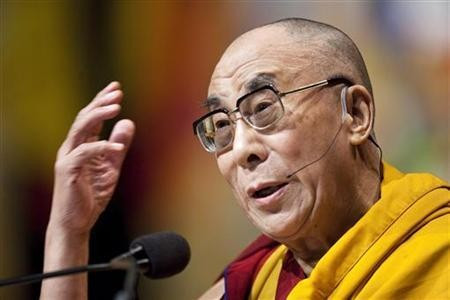Is China Threatening the U.S.?

Tensions between the world's two giants are mounting after China's People's Daily newspaper launched an attack on U.S. President Barack Obama as it described his weekend meeting with the Dalai Lama as an "unscrupulous trick of pragmatism," adding that the move has undermined the U.S.'s status as a major world power.
Obama's meeting with the Dalai Lama, a political exile engaged in separatist activities against China under the guise of religious practice, has grossly interfered in China's internal affairs, the article said.
On Saturday, ahead of the meeting, China urged the United States to immediately withdraw the decision to arrange a meeting between U.S. President Barack Obama and the Dalai Lama.
"The issue regarding Tibet concerns China's sovereignty and territorial integrity, and we firmly oppose any foreign official to meet with the Dalai Lama in any form," said the Foreign Ministry spokesman Hong Lei.
Hong's comments came in response to a question concerning a release on the White House website saying the U.S. President Barack Obama was scheduled to meet the Dalai Lama on July 16.
"We request the U.S. side to honour its serious commitment that recognizes Tibet as part of China and opposes 'Tibet independence', to immediately withdraw the decision of arranging Obama-Dalai Lama meeting, and to avoid interfering in China's internal affairs and damaging China-U.S. relations," the spokesman added.
As the U.S administration ignored China's warning, Bejing has now turned to one of its newspapers to warn the U.S it should respect the principle of non-interference in each other's domestic affairs, which is followed by China and constitute "a basic norm of International Relations."
"Tibet's peaceful liberation and democratic reform was a major historic event, with significance comparable to the liberation of black slaves in America, the abolition of slavery in Europe and the end of the apartheid system in South Africa," the article said.
The article also questioned the knowledge and morality of U.S. media and officials, who are seemingly fooled by the Dalai Lama's "charming smile" and his title of "Nobel laureate," the article said.
Coming back on the history of Tibet, the article says the old Tibet, as it was ruled under the Dalai Lama, used a feudal serf system that wasn't abolished until the 1950s, emphasising that human rights and equality were then not on the top priority lists of the international agenda.
The article also said that "American pragmatists" are using the meeting as a political tool, failing to see the great progress that Tibet has made since its "peaceful liberation" and "democratic reform."
Warning that the Asian country does not appreciate the U.S. using China to try and project a somehow angelic image, the article concluded that it was unfair for the U.S. to handle China-U.S. relations based on its own internal politics, and warned that in doing so, it will not contribute to the stability of China-U.S. ties.
As the article urges Washington to "sincerely" treat Beijing as a strategic partner, it will be interesting to see if the Obama administration bothers responding to Beijing.
© Copyright IBTimes 2025. All rights reserved.





















